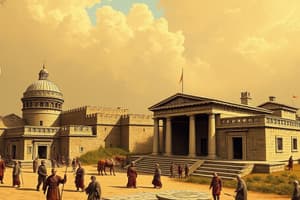Podcast
Questions and Answers
What is the primary focus of the study of history?
What is the primary focus of the study of history?
- Understanding technological advancements
- Exploring future predictions
- Studying ancient languages
- Analyzing past events and societies (correct)
Which of the following periods in history is known for the rise of feudal systems?
Which of the following periods in history is known for the rise of feudal systems?
- Ancient History
- Renaissance
- Modern Era
- Middle Ages (correct)
Which event marked the transition from ancient to medieval Europe?
Which event marked the transition from ancient to medieval Europe?
- The Fall of the Roman Empire (correct)
- The French Revolution
- The invention of the printing press
- The Age of Exploration
What does historiography refer to in the context of history?
What does historiography refer to in the context of history?
Which of the following describes primary sources?
Which of the following describes primary sources?
What key concept helps historians evaluate the reliability of sources?
What key concept helps historians evaluate the reliability of sources?
What movement focused on the struggle for equality and justice in the United States during the 1950s and 1960s?
What movement focused on the struggle for equality and justice in the United States during the 1950s and 1960s?
Which discipline in history examines human societies and cultural evolution?
Which discipline in history examines human societies and cultural evolution?
Flashcards are hidden until you start studying
Study Notes
Definition of History
- Study of past events, societies, and civilizations.
- Focuses on human activities, cultures, and their evolution over time.
Importance of History
- Understanding societal changes, cultural heritage, and shared experiences.
- Provides context for current events and issues.
- Helps in critical thinking and analytical skills.
Major Periods in History
-
Prehistoric Era
- Time before written records.
- Development of early human societies.
-
Ancient History (c. 3000 BCE - 500 CE)
- Civilizations like Mesopotamia, Egypt, Greece, and Rome.
- Key achievements: writing, agriculture, governance.
-
Middle Ages (c. 500 - 1500 CE)
- Feudal systems in Europe, the rise of Islam, and the Byzantine Empire.
- Cultural developments such as Gothic architecture and scholasticism.
-
Renaissance (c. 14th - 17th Century)
- Rebirth of art, science, and literature.
- Humanism and exploration.
-
Modern Era (c. 18th Century - Present)
- Enlightenment, revolutions (American, French, Industrial).
- Development of nations, globalization, and technological advancements.
Key Historical Concepts
- Chronology: The arrangement of events in time.
- Historiography: The study of historical writing and methods.
- Primary vs. Secondary Sources:
- Primary: Original documents, artifacts, firsthand accounts.
- Secondary: Interpretations and analyses of primary sources.
Notable Events and Movements
- The Fall of the Roman Empire (476 CE): Transition from ancient to medieval Europe.
- The Age of Exploration (15th - 17th Century): Global exploration and colonization.
- World Wars (20th Century): Major global conflicts with significant impacts on politics and society.
- Civil Rights Movement (1950s - 1960s): Struggle for equality and justice in the United States.
History and Its Disciplines
- Archaeology: Study of ancient cultures through excavation.
- Anthropology: Examination of human societies and cultural evolution.
- Political Science: Analysis of political systems and behaviors in historical context.
Methodologies in History
- Critical Analysis: Evaluating sources for bias, perspective, and reliability.
- Comparative History: Looking at different societies and time periods to understand patterns.
- Oral History: Collecting and studying personal narratives and experiences.
Challenges in Historical Study
- Historical Bias: Interpretation influenced by the historian’s perspective.
- Incomplete Records: Gaps in the historical record can lead to misunderstandings.
- Cultural Relativism: Understanding history within the context of its time without present-day biases.
Definition of History
- Study of past events, societies, and civilizations.
- Focus on human activities, cultures, and their development over time.
Importance of History
- Facilitates understanding of societal changes, cultural heritage, and collective experiences.
- Offers context for current events and contemporary issues.
- Enhances critical thinking and analytical abilities.
Major Periods in History
- Prehistoric Era: Time prior to written documentation; marks the development of early human societies.
- Ancient History (c. 3000 BCE - 500 CE): Major civilizations include Mesopotamia, Egypt, Greece, and Rome; noted for achievements in writing, agriculture, and governance.
- Middle Ages (c. 500 - 1500 CE): Characterized by feudal systems in Europe, rise of Islam, and the Byzantine Empire; significant cultural advancements like Gothic architecture and scholasticism occurred.
- Renaissance (c. 14th - 17th Century): A revival of art, science, and literature emphasizing humanism and exploration.
- Modern Era (c. 18th Century - Present): Marked by the Enlightenment, major revolutions (American, French, Industrial), emergence of nation-states, globalization, and rapid technological advancements.
Key Historical Concepts
- Chronology: Arrangement of events in their temporal sequence.
- Historiography: Study of historical writing and the methods historians employ.
- Primary vs. Secondary Sources:
- Primary sources are original documents, artifacts, and firsthand accounts.
- Secondary sources consist of interpretations and analyses of primary materials.
Notable Events and Movements
- The Fall of the Roman Empire (476 CE): Signaled the transition from ancient to medieval Europe.
- The Age of Exploration (15th - 17th Century): Involved global exploration and colonization efforts.
- World Wars (20th Century): Major global conflicts that drastically affected political and societal structures.
- Civil Rights Movement (1950s - 1960s): Focused on the pursuit of equality and justice for marginalized groups in the United States.
History and Its Disciplines
- Archaeology: Investigates ancient cultures through excavation and analysis of artifacts.
- Anthropology: Explores human societies and cultural evolution over time.
- Political Science: Studies political systems and behaviors in their historical contexts.
Methodologies in History
- Critical Analysis: Assessing sources for potential bias, perspective, and reliability.
- Comparative History: Examines different societies and eras to identify patterns and connections.
- Oral History: Collects and studies personal narratives and experiences to provide insight into historical contexts.
Challenges in Historical Study
- Historical Bias: Interpretations can be influenced by a historian’s personal views.
- Incomplete Records: Gaps in historical documentation may lead to misconceptions.
- Cultural Relativism: Engaging with history requires understanding within the context of its time, avoiding modern biases.
Studying That Suits You
Use AI to generate personalized quizzes and flashcards to suit your learning preferences.




